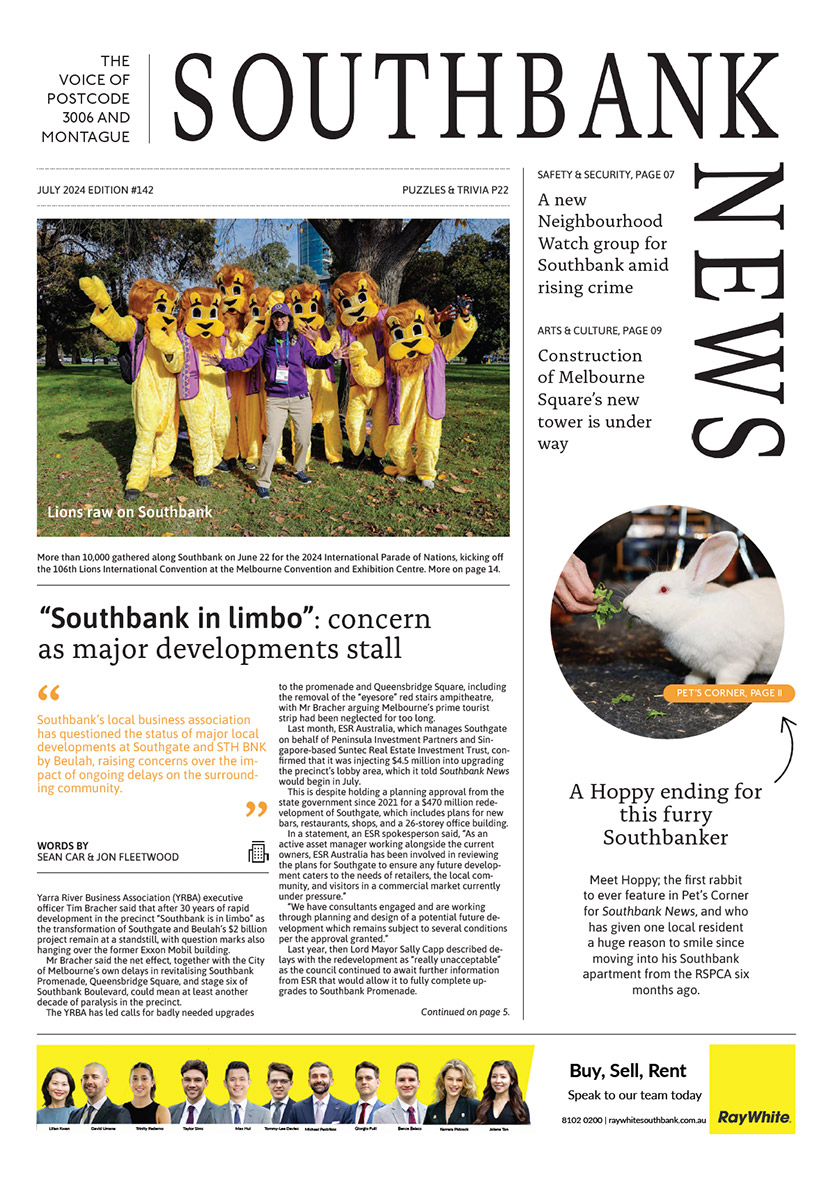Tough times for South Wharf workers
By Rhonda Dredge
There was just one hospitality worker left standing at South Wharf on the last day of winter and he was struggling with what the future held for the industry.
Dane, at Tessie Pearl Hotel, was ready to open the bar as soon as the announcement came.
But he couldn’t figure out how hospitality venues could keep up with the regulations.
The Tessie Pearl caters to party animals and not all of them are good at checking in, let alone getting vaccinated, putting the onus on the venue to stay within the law.
“We’ll probably find we need to do be fully vaxxed to do fun things,” Dane said about the future. “I don’t see a plausible way. We still have so much trouble with people checking in, without checking vaccinations.”
Last time the bar opened he was still teaching people how to check in after three or four weeks.
“They were taking photos of the QR code and asking, ‘where do I send it?’ It’s frustrating. I feel like a pre-school teacher. It means other places are not doing their bit.”
Bars like the Tessie Pearl are not about fine food so they have a quick turnaround when it comes to any new COVID density regulations, but other nearby venues haven’t been as flexible.
“Munich [Brauhaus] won’t open until capacity increases a little because of the amount of staff it takes to run the venue,” Dane said. “Meat Market and Boho weren’t open for a fair while. Showtime’s an event centre. Half the venues won’t re-open.”
It has been a tough time for hospo workers all round. According to figures released in July, 290,000 have been laid off in Australia. Some have recreated their lives by taking up new jobs in quarantine hotels.
According to new research by Edith Cowan University, young hospitality workers are proud to be doing dangerous work for the community but miss being able to provide traditional face-to-face service to guests.
The Pan Pacific and Novotel are both quarantine hotels and they now have the biggest workforces on South Wharf but there have been few flow-on effects for the local economy, despite some earning up to $100,000 for 12-month contracts.
Rona Walk is deserted except for police, an occasional skateboarder and quarantine workers sitting outside the hotel on their breaks. Yet back in October 2020, when Southbank News first reported the takeover of security by police, businesses were still open and clinging to hope of returning to normal as a tourist destination.
Now, the problem of containing the virus has overwhelmed all other narratives. No-one wants a repeat of June 2020 when 20 hotel employees in Melbourne contracted the virus, leading to the city’s second wave.
Those looking for vestiges of the hospitality industry on South Wharf won’t find them. DFO is closed for all but click and collect. The Urban Hub, a convenience store next to the hotels, is closed. Workers at DFO have to cross a bridge to find food. Quarantine workers are fed by the hotels and police are a major presence along Southbank.
“It’s very tough,” Dane said. “The reason it’s so stressful for us is because of the fines. If half haven’t checked in, these fines would be enough to close the business.”
He said that venues were fined $5000 for every person who does not check in. “You heavily rely on discretion. If you act like a goose, you’ll probably have the book thrown at you.”
Even small-time operators like the Rose Guy are on the back foot. He’s not saying that romance is dead, but he isn’t making back the rent of $300 a month he pays to the City of Melbourne for a spot on the pavement.
“I’ve got a permit and pay rent but maybe I shouldn’t be here,” he said.

Sally Capp: one last chat as Lord Mayor of Melbourne







 Download the Latest Edition
Download the Latest Edition